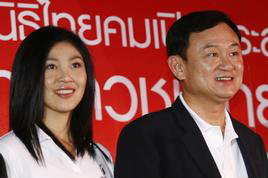On July 3, Thailand goes to the polls. Normally, an election in Thailand would not be of any real interest to tourists, but the Thai political problems witnessed in recent years means that visitors to the country are also anticipating what may or may not happen in Thailand in the forthcoming weeks and months.
There is an election campaign rally scheduled for this Thursday (June 23) at the Ratchaprasong Intersection which is close to the central Siam shopping area in central Bangkok. This location was the focal point for the red shirt movement during last year’s anti-government street protests. It has also been the location for the subsequently peaceful rallies and commemorative events held by the red shirts to remember those who died during the violence that broke out in April and May last year. However, the rally on Thursday is not by the red shirts, but instead is being held by Prime Minister Abhisit and the ruling Democrat Party who are using the platform to remind voters that this was the location where so much damage was done to Thailand and her reputation. So far, the election campaign has been largely without incident and there is no real reason to see that changing. That said, Thursday’s rally in Bangkok has the potential to attract some hotheads from either side of the political divide who may see it as an opportunity to create some mischief, although security should be tight.
Depending on the outcome of the election, there is the possibility of either pro- or anti-red shirt protests in Bangkok before the end of the year, but I don’t wish to overplay this. As always, I will post updates on the current situation on this site, but there is no need for visitors to Thailand to panic or start cancelling holidays and vacations.
To be ultra-cautious, you can avoid wearing red or yellow shirts and avoid talking about politics. On the weekend of the election, some bars and clubs in Thailand may stop selling alcohol (particularly in Bangkok) to comply with local and national laws, but this is very much dependent on the attitude taken by the local police and any arrangements that business owners have in place with them. Apart from that, most visitors to Thailand are unlikely to be affected by the election campaign.
The two main candidates in the election are Abhisit Vejjajiva from the ruling Democrat Party and Yingluck Shinawatra from the opposition Pheu Thai party.  Prime Minister Abhisit currently heads a coalition government having come to power in extraordinary circumstances in December 2008. Yingluck Shinawatra is the younger sister of the former Thai leader, Thaksin Shinawatra.
Prime Minister Abhisit currently heads a coalition government having come to power in extraordinary circumstances in December 2008. Yingluck Shinawatra is the younger sister of the former Thai leader, Thaksin Shinawatra.
(photo shows Yingluck with her older brother Thaksin)
The opposition Pheu Thai party can be broadly viewed as the political arm of the red shirt movement. There is little doubt that deposed prime minister Thaksin Shinawatra remains a hugely influential figure for the red shirts and the decision to choose political rookie Yingluck, the younger sister of Thaksin, plays to the broad-base of red shirt support.
The yellow shirt movement played a key role in deposing Thaksin from office in the events that led up to the bloodless military coup in 2006. The yellow shirts, led by the People’s Alliance for Democracy (PAD) were also instrumental in the dismissal of the pro-Thaksin governments that would follow in the subsequent years. The yellow shirts were vehemently opposed to Thaksin and his allies and they showed their strength with the occupation of Bangkok’s airports in 2008. That was the catalyst that led to the current government coming to power. However, since that time there have been divisions within PAD and although they formed a political party, they are not considered a key player in the election. Rather than pitching the forthcoming election as a battle between red shirts and yellow shirts, it is, in very general terms, more a case of pro-Thaksin supporters versus anti-Thaksin supporters.
The latest opinion polls predict a close race, but there has been a recent increase in support for Pheu Thai and Yingluck Shinawatra. The pro-red shirts may get the most votes, but they will still need to gain an overall majority to form a government. It is quite possible that no single party will hold an overall majority and this could lead to another coalition government. If that is the case, it will be some of the smaller political parties who hold the key to the balance of power. As has been seen in the past in Thai politics, political foes can form alliances and just about any outcome is still possible.
Regardless of the outcome of the election, it will not provide an immediate answer to Thailand’s political problems. It will require genuine reconciliation from all sides before that can happen, but it can happen. Thailand is still a youngster in terms of being a democracy. She is an adolescent democracy with all the mood swings, temper tantrums and irrational behaviour that go with it, but this election presents a real opportunity for Thailand to come of age.
Photo credit: Pattanapong Hirunard at Bangkok Post